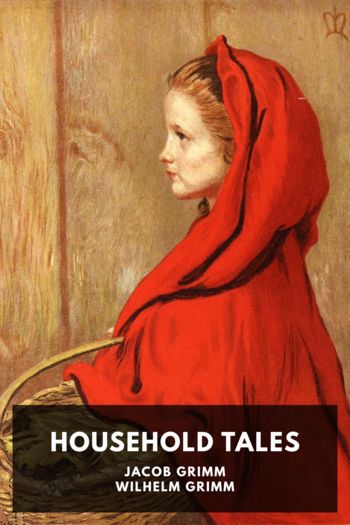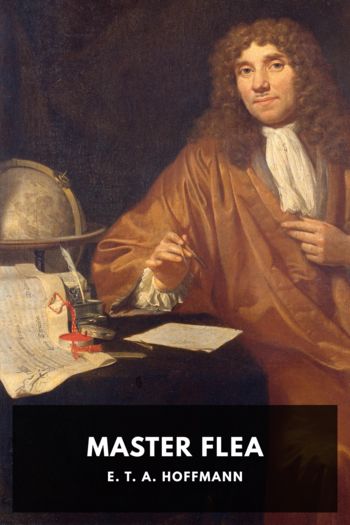Household Tales - Jacob Grimm (read me a book .txt) 📗

- Author: Jacob Grimm
Book online «Household Tales - Jacob Grimm (read me a book .txt) 📗». Author Jacob Grimm
“Yes,” replied Two-eyes, “that I certainly shall be able to do, for the tree belongs to me.” And she climbed up, and with the greatest ease broke off a branch with beautiful silver leaves and golden fruit, and gave it to the knight.
Then said the knight, “Two-eyes, what shall I give thee for it?”
“Alas!” answered Two-eyes, “I suffer from hunger and thirst, grief and want, from early morning till late night; if you would take me with you, and deliver me from these things, I should be happy.” So the knight lifted Two-eyes on to his horse, and took her home with him to his father’s castle, and there he gave her beautiful clothes, and meat and drink to her heart’s content, and as he loved her so much he married her, and the wedding was solemnized with great rejoicing. When Two-eyes was thus carried away by the handsome knight, her two sisters grudged her good fortune in downright earnest.
“The wonderful tree, however, still remains with us,” thought they, “and even if we can gather no fruit from it, still everyone will stand still and look at it, and come to us and admire it. Who knows what good things may be in store for us?” But next morning, the tree had vanished, and all their hopes were at an end. And when Two-eyes looked out of the window of her own little room, to her great delight it was standing in front of it, and so it had followed her.
Two-eyes lived a long time in happiness. Once two poor women came to her in her castle, and begged for alms. She looked in their faces, and recognized her sisters, One-eye, and Three-eyes, who had fallen into such poverty that they had to wander about and beg their bread from door to door. Two-eyes, however, made them welcome, and was kind to them, and took care of them, so that they both with all their hearts repented the evil that they had done their sister in their youth.
Fair Katrinelje and Pif-Paf-Poltrie“Good day, Father Hollenthe.”
“Many thanks, Pif-paf-poltrie.”
“May I be allowed to have your daughter?”
“Oh, yes, if Mother Malcho (Milch-cow), Brother High-and-Mighty, Sister Käsetraut, and fair Katrinelje are willing, you can have her.”
“Where is Mother Malcho, then?”
“She is in the cow-house, milking the cow.”
“Good day, Mother Malcho.”
“Many thanks, Pif-paf-poltrie.”
“May I be allowed to have your daughter?”
“Oh, yes, if Father Hollenthe, Brother High-and-Mighty, Sister Käsetraut, and fair Katrinelje are willing, you can have her.”
“Where is Brother High-and-Mighty, then?”
“He is in the room chopping some wood.”
“Good day, Brother High-and-Mighty.”
“Many thanks, Pif-paf-poltrie.”
“May I be allowed to have your sister?”
“Oh, yes, if Father Hollenthe, Mother Malcho, Sister Käsetraut, and fair Katrinelje are willing, you can have her.”
“Where is Sister Käsetraut, then?”
“She is in the garden cutting cabbages.”
“Good day, sister Käsetraut.”
“Many thanks, Pif-paf-poltrie.”
“May I be allowed to have your sister?”
“Oh, yes, if Father Hollenthe, Mother Malcho, Brother High-and-Mighty, and fair Katrinelje are willing, you may have her.”
“Where is fair Katrinelje, then?”
“She is in the room counting out her farthings.”
“Good day, fair Katrinelje.”
“Many thanks, Pif-paf-poltrie.”
“Wilt thou be my bride?”
“Oh, yes, if Father Hollenthe, Mother Malcho, Brother High-and-Mighty, and Sister Käsetraut are willing, I am ready.”
“Fair Katrinelje, how much dowry do hast thou?”
“Fourteen farthings in ready money, three and a half groschen owing to me, half a pound of dried apples, a handful of fried bread, and a handful of spices.
“And many other things are mine,
Have I not a dowry fine?”
“Pif-paf-poltrie, what is thy trade? Art thou a tailor?”
“Something better.”
“A shoemaker?”
“Something better.”
“A husbandman?”
“Something better.”
“A joiner?”
“Something better.”
“A smith?”
“Something better.”
“A miller?”
“Something better.”
“Perhaps a broom-maker?”
“Yes, that’s what I am, is it not a fine trade?”
The Fox and the HorseA peasant had a faithful horse which had grown old and could do no more work, so his master would no longer give him anything to eat and said, “I can certainly make no more use of thee, but still I mean well by thee; if thou provest thyself still strong enough to bring me a lion here, I will maintain thee, but now take thyself away out of my stable,” and with that he chased him into the open country. The horse was sad, and went to the forest to seek a little protection there from the weather.
Then the fox met him and said, “Why dost thou hang thy head so, and go about all alone?”
“Alas,” replied the horse, “avarice and fidelity do not dwell together in one house. My master has forgotten what services I have performed for him for so many years, and because I can no longer plough well, he will give me no more food, and has driven me out.”
“Without giving thee a chance?” asked the fox.
“The chance was a bad one. He said, if I were still strong enough to bring him a lion, he would keep me, but he well knows that I cannot do that.”
The fox said, “I will help thee, just lay thyself down, stretch thyself out, as if thou wert dead, and do not stir.”
The horse did as the fox desired, and the fox went to the lion, who had his den not far off, and said, “A dead horse is lying outside there, just come with me, thou canst have a rich meal.” The lion went with him, and when they were both standing by the horse the fox said, “After all, it is not very comfortable for thee here I tell thee what





Comments (0)